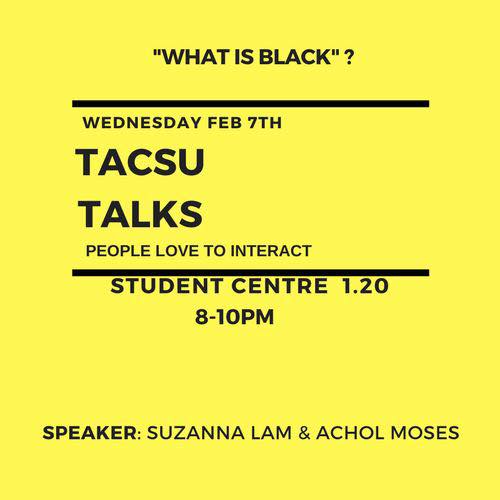
Arthur attended last week’s Trent African & Caribbean Student Union event, TACSU Talks. It was titled What is Black? The speakers Suzanna Lam and Achol Moses’s inspiration for the topic came from how often “we see Black History Month used worldwide as a time to celebrate black leaders and heroes and the struggles they helped us overcome as a people. This approach to the celebration points to the idea that Black history is a history only of struggle.”
The speakers mentioned in their presentation that they believe it should be a time to rejoice and for understanding as well, so they organised this TACSU Talks event in order to shine a light on the triumphs and what these triumphs mean for the people today. The presentation mainly focused on the discussions of the concept of what “Black” is and who is “Black,” as well as how “Black” behaves.
Throughout the talk they covered the geographic and historical origins of Black people, a timeline of important events in the modern history and analyzed the different systems of classification. One particularly interesting part of the presentation, in this writer’s opinion, was the bridge the speakers formed between the genetic background and energies between local and global communities in Black culture.
In one of his many speeches, the British rapper, poet and political activist Akala once said that it is important for Black History Month to move beyond just talking about what was done to Black civilization — although still very important — and to talk about their accomplishments and achievements. This is exactly what we saw the TACSU Talks try to achieve in their event. They mentioned the first slave rebellion in the Dominican Republic which lead the first slave uprising in the New World, when slaves led an uprising in the sugar plantation of admiral Don Diego Colón, the son of Christopher Columbus. Additionally, they discussed the Black consciousness movement which emerged in the South Africa in the mid 60s, as well as Mathieu Da Costa; and Wangari Maathai, an environmental activist and most importantly the first East African to receive a PhD in US who died in 2011.
The discussion floor opened up with a simple question: what comes to mind when you think about Black history? There were answers like “slavery” from the audience. However, one response from a student got the most attention and began a deeper conversation on how we see Black history in our education system in Canada and more generally all around the world. This audience member responded saying “everything”: when you think of Black history, it is everything. Whilst children in European and North American schools are constantly quizzed on their own immediate history, there is often very little beyond that — even if these countries often have deep legacies in other parts of the world. Indeed, perhaps this is why Black History Month is sometimes seen as only the history of a variety struggles, and asking “what is Black history” indicates a kind of an answer to its own question.
One of the other most engaging discussion points were on how we perceive Black, as a color, a person or a culture. Does being black describe a culture or a skin color mostly? Black culture is not only one culture. It has a history and it is more than a skin color. According to the speakers there are three interpretations of Black: it is a social construct and a historic and genetic background, at the same time as it is also a consciousness and an energy.
Another heated topic discussed in the talk was finances and brands that have recently been protested against, with particular reference to Kanye West’s fashion designs and prices. This topic discussion overall underlined that Black people shouldn’t criticize, feel ashamed or talk down on the successful Black brands or artists and should go against the current protests of brands like Hilfiger.
TACSU will be hosting one more TACSU Talks event, on February 28, a Black is Beauty showcase.
